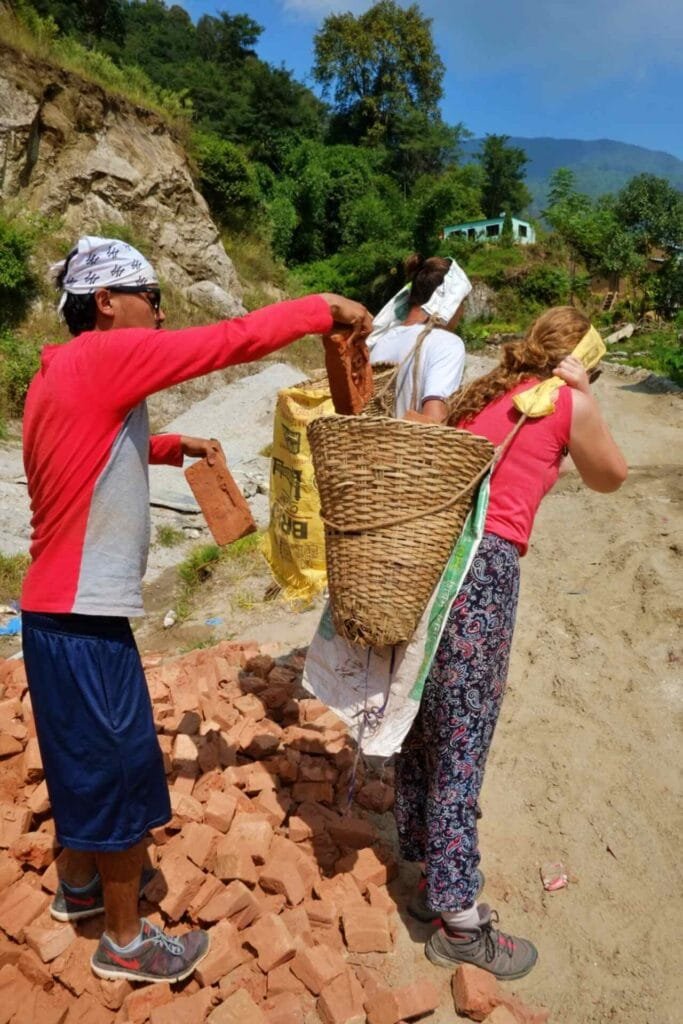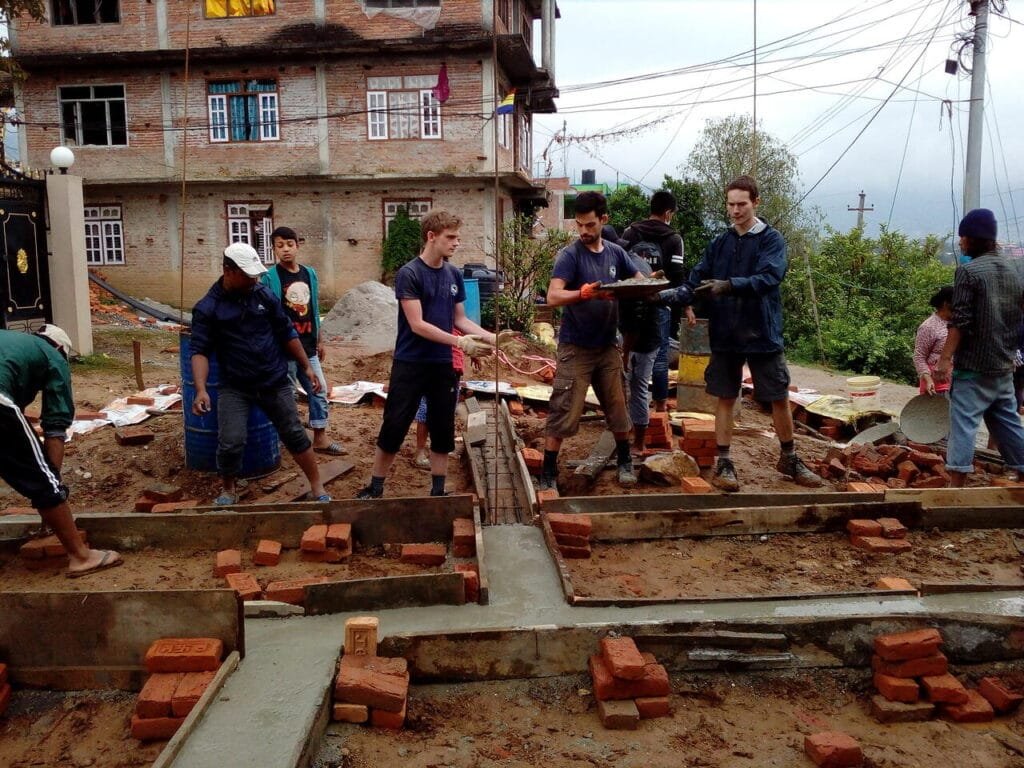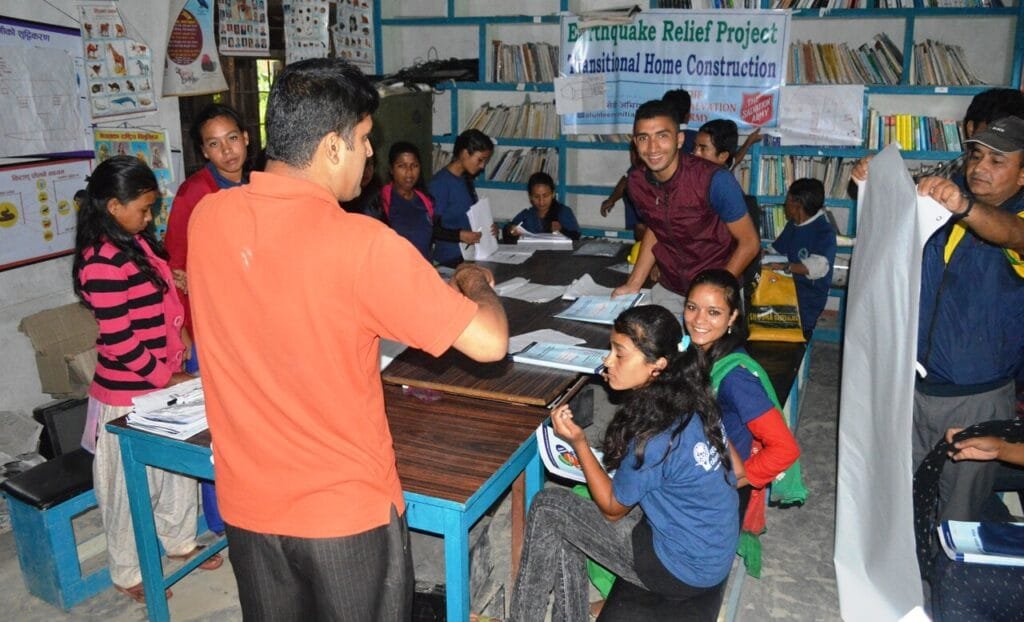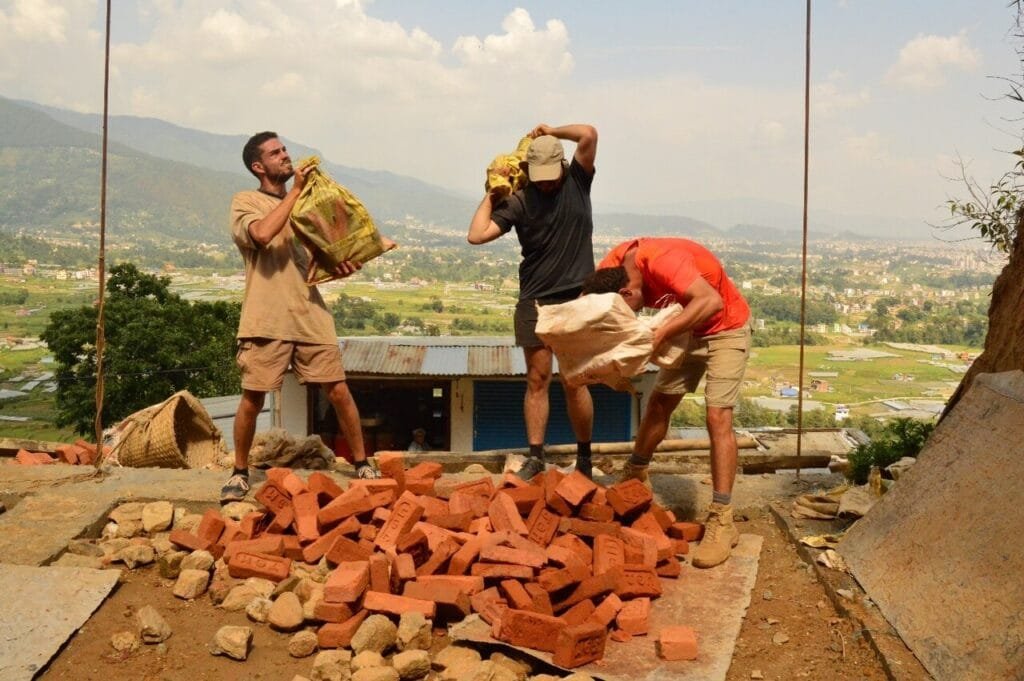Join International Disaster Response Volunteers and Emergency Management Volunteer Opportunities to Transform Nepal’s Disaster Readiness
Overview
Project Name: Nepal Disaster Resilience Initiative
Tagline: Empowering Communities Through Preparedness, Response, and Recovery
Welcome to the Nepal Disaster Resilience Initiative, an impactful volunteer project by Volunteers Initiative Nepal (ViN) focused on strengthening Nepal’s disaster preparedness and response capabilities. Our program offers exceptional Disaster Preparedness Volunteer Programs that unite passionate individuals worldwide. By joining as one of our International Disaster Response Volunteers and exploring Emergency Management Volunteer Opportunities, you will work alongside local communities and experts to enhance Nepal’s resilience to natural and artificial disasters.
Project Description
Introduction
The Nepal Disaster Resilience Initiative empowers communities by building robust disaster preparedness and response systems. Focusing on Disaster Preparedness Volunteer Programs, our project aims to equip local communities with the knowledge, skills, and resources needed to manage and recover from disasters effectively. Our comprehensive program involves hands-on training, community engagement, and strategic planning in collaboration with government agencies, local organizations, and international partners. Whether you are interested in joining International Disaster Response Volunteers or exploring Emergency Management Volunteer Opportunities, this initiative provides a dynamic platform for making a tangible impact.
This program integrates various facets of disaster management, including emergency preparedness training, crisis response, and recovery operations. By working on projects such as Disaster Relief Training Programs and Volunteer Disaster Response Teams, you will help build a proactive, well-prepared network capable of mitigating disasters’ impacts on vulnerable communities.
Background
Nepal is highly susceptible to natural disasters, including earthquakes, floods, landslides, and severe storms. The devastating earthquake of 2015, for example, left a lasting mark on the country—displacing over 3.5 million people and causing extensive damage to infrastructure and livelihoods. Despite progress in recovery and rebuilding, many regions in Nepal remain vulnerable due to limited disaster preparedness, inadequate emergency services, and constrained resources.
Recent statistics from the United Nations Office for Disaster Risk Reduction (UNDRR) indicate that over 40% of Nepal’s population is at high risk of natural disasters, highlighting the urgent need for comprehensive disaster management solutions. Traditional practices and local knowledge play an important role; however, modern techniques and coordinated international efforts are essential to enhance resilience.
Our initiative addresses these challenges by promoting Disaster Preparedness Volunteer Programs emphasizing sustainable recovery, community-based disaster risk reduction, and capacity building. We leverage innovative practices in emergency management and work with Community Emergency Response Teams (CERT) to prepare local populations. Through Humanitarian Aid Volunteer Programs and Crisis Response Volunteer Opportunities, we strive to ensure communities can respond effectively when disasters strike.
Key Objectives
Several key objectives guide the Nepal Disaster Resilience Initiative:
- Strengthen Disaster Preparedness:
Implement comprehensive Emergency Preparedness Training programs that equip communities with the skills to anticipate and respond to disasters. - Enhance Response Capabilities:
Develop and support Volunteer Disaster Response Teams that work closely with local CERT units and emergency services. - Improve Crisis Management:
Provide training and resources for Emergency Management Volunteer Opportunities that prepare communities to manage crises effectively. - Foster International Collaboration:
Engage International Disaster Response Volunteers in collaborative efforts that bring global expertise to local challenges. - Promote Humanitarian Aid:
Support Humanitarian Aid Volunteer Programs that deliver immediate relief and long-term recovery assistance during emergencies. - Advance Disaster Relief Training:
Organize Disaster Relief Training Programs that cover search and rescue, first aid, and crisis communication, ensuring rapid, effective response. - Support Public Health and Safety:
Mobilize Public Health Emergency Volunteers to address medical and sanitation needs during disasters. - Enhance Recovery and Resilience:
Facilitate Disaster Recovery Volunteer Programs that assist communities in rebuilding infrastructure and restoring livelihoods. - Mitigate Climate Change Impacts:
Integrate climate resilience into disaster preparedness strategies through Disaster Risk Reduction Volunteer initiatives. - Promote Sustainable Development:
We will align our efforts with global sustainable development goals by promoting International Relief Volunteer Programs and Volunteer Emergency Services that support long-term community well-being.
Why Volunteer for This Project?
The Need
Nepal’s vulnerability to natural disasters necessitates a well-coordinated, community-based approach to disaster management. With millions of people at risk, enhancing local resilience through Disaster Preparedness Volunteer Programs is not just an option but a critical necessity. Natural disasters continue to cause immense human and economic losses, with the 2015 earthquake serving as a stark reminder of the devastating impacts of unpreparedness. Studies show timely and effective disaster response can reduce casualties and speed up recovery times by up to 50%.
You will play a vital role in reducing these impacts by joining our initiative. As an International Disaster Response Volunteer and participant in Emergency Management Volunteer Opportunities, your contribution will directly support efforts to train local communities, establish effective response systems, and facilitate rapid recovery operations. Your skills and passion can help transform Nepal’s capacity to handle disasters and save lives.
Global Relevance
Disaster preparedness and response are critical components of global health and safety. The United Nations and other international bodies emphasize building resilient communities through coordinated disaster risk reduction strategies. Our program aligns with these global priorities by integrating the best practices from International Relief Volunteer Programs and Volunteer Emergency Services with local expertise.
International collaboration in disaster preparedness improves local outcomes and contributes to global knowledge and resource sharing. By participating in Disaster Relief Training Programs and engaging with Volunteer Disaster Response Teams, you will gain valuable insights and contribute to a worldwide effort to mitigate the effects of natural disasters. This global perspective is essential for addressing the interconnected challenges of climate change and disaster risk reduction.
Local Voices
Local communities in Nepal have witnessed firsthand the devastating effects of natural disasters and the critical need for effective preparedness and response. A community leader in a disaster-prone district shared:
“Every disaster leaves us reeling, but with proper tr, stronger and faster. Volunteers with proper training, support, and expertise help us prepare for the next crisis. Their work saves lives and strengthens our community.” This heartfelt testimony underscores the pressing need for Disaster Preparedness Volunteer Programs in Nepal and highlights the transformative impact of initiatives like ours. By volunteering, you will be a beacon of hope for communities that depend on quick and effective disaster response to secure their future.
Volunteers’ Roles and Responsibilities
Core Tasks for Volunteers
As a volunteer in our Disaster Preparedness Volunteer Programs, you will engage in various tasks designed to build community resilience and improve emergency response. Here are twelve core tasks you will perform:
- Facilitate Emergency Preparedness Training:
Lead training sessions that cover essential emergency preparedness skills such as first aid, fire safety, and evacuation procedures. This is a cornerstone of our Emergency Preparedness Training efforts. - Support Community Emergency Response Teams (CERT):
Work directly with local CERT units to train community members in basic emergency response techniques, enhancing overall disaster readiness. - Coordinate Disaster Relief Training Programs:
Organize and deliver workshops on disaster relief, including search and rescue techniques, crisis communication, and logistical planning. These sessions support Disaster Relief Training Programs. - Engage in Crisis Response Planning:
Collaborate with local authorities and NGOs to develop effective crisis response plans tailored to specific community needs, supporting Crisis Response Volunteer Opportunities. - Assist in Medical Response Efforts:
Participate in first aid, triage, and basic medical care as part of Medical Reserve Corps Volunteer initiatives to support local health teams during emergencies. - Participate in Volunteer Firefighter Programs:
If qualified, assist in volunteer firefighting efforts to help contain and manage fires during disasters, contributing to Volunteer Firefighter Programs. - Support Search and Rescue Operations:
Engage in Search and Rescue Volunteer Opportunities by helping locate and assist victims during emergencies, a vital component of effective disaster response. - Contribute to Disaster Recovery Efforts:
Work on long-term recovery projects, including rebuilding infrastructure, restoring livelihoods, and facilitating community rehabilitation. This supports Disaster Recovery Volunteer Programs. - Assist in Public Health Emergency Initiatives:
Support vaccination drives, sanitation campaigns, and health education by Public Health Emergency Volunteers to help manage public health responses during disasters. - Participate in Natural Disaster Volunteer Opportunities:
Engage in initiatives that focus on preparing for and mitigating the impact of natural disasters, such as floods and earthquakes, contributing to Natural Disaster Volunteer Opportunities. - Support Volunteer Emergency Services:
Assist in coordinating local emergency services, ensuring rapid and efficient response during disasters. This includes logistical support, resource management, and communication with local authorities. - Promote Disaster Risk Reduction:
Work on projects to reduce disaster risk through community education, policy advocacy, and sustainable development practices, aligning with Disaster Risk Reduction Volunteer initiatives.
Daily Activities
A typical day in our Disaster Preparedness Volunteer Programs is structured to combine hands-on training, community outreach, and cultural immersion. Below is a sample daily schedule:
- 08:30 – 09:15:
Start your day with a nutritious breakfast and attend a morning briefing to review the day’s schedule, safety protocols, and assignments. - 09:15 – 10:00:
Prepare training materials, review emergency response plans, and set up equipment for field activities. - 10:00 – 13:00:
Participate in hands-on emergency preparedness training sessions and support local CERT teams. Engage in activities such as first aid drills, evacuation simulations, and crisis communication workshops, forming the backbone of our Emergency Preparedness Training. - 13:00 – 14:00:
Take a lunch break and network with fellow volunteers, local emergency responders, and community leaders to exchange insights and share experiences. - 14:00 – 16:00:
Conduct community outreach initiatives, including door-to-door visits and public seminars on disaster preparedness. These activities are crucial for Crisis Response Volunteer Opportunities and Volunteer Disaster Response Teams. - 16:00 – 17:00:
Engage in a debriefing session with local coordinators to assess the day’s progress, discuss challenges, and plan for upcoming activities. - 17:00 – 18:00:
Participate in special projects or workshops on disaster risk reduction and climate change adaptation. This period supports ongoing training for Disaster Relief Training Programs and Global Health Volunteer Programs. - 18:00 Onwards:
Enjoy cultural immersion activities such as local community events, language classes, or cultural tours, deepening your connection with Nepalese culture and enhancing your overall volunteer experience.
Special Projects
Our Disaster Preparedness Volunteer Programs in Nepal include several special initiatives designed to extend your impact and deepen your learning experience:
- Emergency Response Simulations:
Organize large-scale disaster drills and simulations to test and improve community response capabilities. These exercises are essential for Emergency Preparedness Training and preparing Volunteer Emergency Services. - Search and Rescue Training Camps:
Lead training sessions and practical exercises on search and rescue operations, providing volunteers with the skills needed for Search and Rescue Volunteer Opportunities. - Medical Reserve Corps Initiatives:
Collaborate with local health professionals to offer first aid and emergency care training, reinforcing Medical Reserve Corps Volunteer programs during disasters. - Disaster Recovery Projects:
Engage in long-term recovery efforts that involve rebuilding critical infrastructure, restoring community services, and supporting economic recovery after a disaster, contributing to Disaster Recovery Volunteer Programs. - Public Health Emergency Workshops:
Facilitate workshops on managing public health crises during disasters, covering disease prevention, sanitation, emergency medical care, and aligning with Public Health Emergency Volunteers. - Volunteer Firefighter and Emergency Services Training:
Support training sessions for volunteers interested in firefighting and emergency service coordination, enhancing local capacity through Volunteer Firefighter Programs and Volunteer Emergency Services. - Disaster Risk Reduction Advocacy:
Lead advocacy campaigns that promote policies and practices to reduce disaster risk and enhance community resilience, aligning with Disaster Risk Reduction Volunteer initiatives. - International Relief Collaboration:
Participate in joint projects with international relief organizations to share resources, expertise, and best practices, reinforcing International Relief Volunteer Programs and expanding global cooperation. - Climate Adaptation and Mitigation Workshops:
Conduct sessions on climate change adaptation strategies and sustainable practices that reduce vulnerability to natural disasters, supporting Crisis Response Volunteer Opportunities. - Community Resilience Building:
Work on projects that focus on improving communities’ overall resilience by integrating disaster preparedness into everyday planning and promoting Humanitarian Aid Volunteer Programs.
Skills and Requirements
Required Skills
To excel in our Disaster Preparedness Volunteer Programs in Nepal, you should possess:
- A strong passion for humanitarian aid, disaster management, and environmental conservation.
- Excellent communication, leadership, and teamwork skills.
- A background or keen interest in emergency management, first aid, or crisis response.
- Physical stamina and the ability to work in challenging, high-pressure environments.
- Proficiency in basic first aid and emergency response techniques; additional training is provided.
- Strong organizational skills and attention to detail.
- Cultural sensitivity and the ability to work effectively with diverse communities.
- A proactive and solution-oriented mindset to address unforeseen challenges.
- A commitment to public service and making a lasting impact on community resilience.
Eligibility
Our program is open to individuals aged 18 and above, including students, professionals, and experienced volunteers in disaster management and humanitarian aid. My passion for disaster preparedness and community service is the most essential qualification. Whether you are pursuing international disaster response roles or seeking emergency management volunteer opportunities.
Preferred Skills
While not mandatory, the following skills will enhance your experience:
- Prior experience in emergency management, search and rescue operations, or volunteer firefighting.
- Familiarity with disaster risk reduction strategies and public health emergency protocols.
- Experience working with community emergency response teams (CERT) or humanitarian aid organizations.
- Ability to use digital tools for crisis communication and data management.
- Multilingual abilities to communicate effectively with local communities.
- A professional portfolio or recommendations highlighting your contributions to disaster preparedness or humanitarian aid.
- Experience in Volunteer Disaster Response Teams or Crisis Response Volunteer Opportunities is highly advantageous.
Cultural Experience
Immersion in Local and Global Cultures
Our Disaster Preparedness Volunteer Programs in Nepal provide a unique opportunity to immerse yourself in the country’s rich cultural tapestry. As you work with local communities, you will experience traditional Nepalese customs, festivals, and daily life. This cultural immersion is essential for understanding the social dynamics influencing disaster preparedness and response. Engaging with local community members and emergency responders will deepen your appreciation for Nepalese resilience and the importance of collaborative disaster management.
Language and Communication
Effective communication is paramount in disaster management. We offer optional language workshops to help you learn basic Nepali phrases and understand local cultural nuances, ensuring you can communicate effectively during training sessions and emergencies. Improved language skills enhance your volunteer experience, strengthen community ties, and facilitate smoother coordination with local teams and responders.
Logistics and Support
Accommodation
We provide safe, comfortable, and culturally immersive accommodations for on-site volunteers. Options include local guesthouses, shared volunteer houses, or homestays that offer an authentic Nepalese experience. These arrangements support your daily activities, foster community among volunteers, and ensure you feel secure and well-supported throughout your assignment.
Meals
Nutritious meals are served three times a day, featuring traditional Nepalese cuisine with options to accommodate vegetarian and other dietary preferences. Our meal plans keep you energized and focused during long training, fieldwork, and community outreach days.
Transportation
Reliable transportation services are arranged for all on-site activities, including airport pickups and daily shuttles to community centers, training sites, and disaster response locations. Our organized logistics allow you to focus entirely on your volunteer responsibilities, ensuring a seamless and stress-free experience throughout your Disaster Preparedness Volunteer Programs placement.
On-Site and Virtual Support
A dedicated team of coordinators, emergency management experts, and local staff is available around the clock to support you during your volunteer assignment. They provide guidance on emergency procedures, assist with technical or logistical challenges, and offer continuous feedback during on-site and virtual training workshops. This comprehensive support system is crucial for your success in our International Disaster Response Volunteers and Emergency Management Volunteer Opportunities programs.
Health and Safety
Your health and safety are our utmost priorities. We conduct thorough health and safety briefings, provide necessary vaccinations, and ensure you have access to comprehensive travel insurance and emergency protocols. These measures safeguard you throughout your volunteer experience, ensuring a secure and supportive environment for you and the communities you serve.
Program Fees and Inclusions
Our transparent fee structure covers all essential components of your Disaster Preparedness Volunteer Programs experience in Nepal:
- Digital Tools and Educational Materials:
Full access to training guides, emergency preparedness manuals, digital presentation tools, curriculum materials, and crisis management resources. - Virtual and On-Site Training Sessions:
Participation in live webinars, interactive workshops, and hands-on training sessions as part of our Disaster Relief Training Programs and Volunteer Disaster Response Teams modules. - Accommodation and Meals:
Safe, culturally immersive lodging, along with nutritious meals, will be provided during your assignment. - Transportation:
Organized transfers between the airport, accommodations, and project sites. - On-Site Support and Mentorship:
Continuous guidance from experienced emergency responders, disaster management experts, and local coordinators. - Special Projects and Initiatives:
Inclusion in long-term projects such as community emergency response training, search and rescue drills, and public health emergency initiatives. - Wellness Programs:
Access to virtual wellness sessions and support initiatives designed to maintain a healthy work-life balance.
For detailed fee information, please visit our Program Fees & Inclusions page. Your investment in this program enhances your professional development and supports broader efforts in building resilient, disaster-ready communities in Nepal.
Impact and Outcomes
Volunteer Impact
Participants in our Disaster Preparedness Volunteer Programs consistently report transformative experiences that have a lasting impact on their personal and professional growth:
- Enhanced Emergency Management Skills:
Through hands-on training and real-world exercises, volunteers gain practical expertise in emergency response, crisis management, and disaster risk reduction. - Robust Professional Portfolio:
Build a diverse portfolio showcasing your contributions to disaster relief, emergency preparedness training, and public health interventions, strengthening your credentials for future roles in disaster management. - Global Perspective:
Develop a comprehensive understanding of international disaster response strategies and emergency management practices through immersive experiences with International Disaster Response Volunteers. - Networking Opportunities:
Connect with emergency management professionals, local responders, and international humanitarian aid organizations. - Increased Leadership and Crisis Communication Skills:
Enhance your ability to lead teams during emergencies, coordinate with local authorities, and effectively communicate under pressure. - Career Advancement:
Many alumni describe the experience as “life-changing” and “career-defining,” opening doors to advanced roles in emergency management, disaster response, and humanitarian aid. - Personal Fulfillment:
Experience the deep satisfaction of saving lives, supporting vulnerable communities, and contributing to a safer, more resilient world.
Community Impact
Our Disaster Preparedness Volunteer Programs have a profound and lasting impact on local communities in Nepal:
- Improved Disaster Response Capabilities:
Through comprehensive training and capacity-building initiatives, communities are better prepared to respond to natural and artificial disasters, reducing casualties and speeding up recovery. - Enhanced Public Safety:
By establishing robust Community Emergency Response Teams (CERT) and training local responders, communities become more resilient and self-reliant in crises. - Increased Access to Emergency Services:
Initiatives such as Volunteer Firefighter Programs and Search and Rescue Volunteer Opportunities provide critical services during emergencies, ensuring timely response and care. - Strengthened Local Infrastructure:
Emergency preparedness training and disaster relief efforts contribute to the rebuilding and strengthening of local infrastructure, making communities more resilient to future disasters. - Economic Benefits:
Effective disaster response minimizes economic losses, protects livelihoods, and promotes long-term sustainable development. - Enhanced Health Outcomes:
Public health emergency initiatives reduce the spread of disease and ensure that communities receive essential medical care during and after disasters. - Environmental Resilience:
By integrating climate change adaptation strategies into disaster preparedness plans, communities are better equipped to manage natural hazards and protect natural resources. - Social Cohesion and Empowerment:
Collaborative disaster preparedness programs foster a sense of unity and empower residents to actively participate in creating a safer environment.
Success Stories and Testimonials
Our alums and community partners have shared inspiring stories that underscore the transformative impact of our Disaster Preparedness Volunteer Programs in Nepal:
“Volunteering as an international disaster response volunteer in Nepal was a truly transformative experience. I worked with local CERT teams, and together, we conducted emergency drills that prepared communities for real crises. The gratitude and resilience of the people we served were incredibly inspiring.”
— Alex, Former Volunteer
“My experience on a medical reserve corps mission in Nepal opened my eyes to the importance of preparedness. The training in search and rescue and emergency management was intense but deeply rewarding. I now feel better equipped to handle crises in any part of the world.”
— Jamie, Alumni
“Working with volunteer firefighter programs and participating in disaster recovery efforts showed me the real impact of community resilience. The hands-on training and the collaborative spirit among volunteers made this program unforgettable.”
— Casey, Former Volunteer
“The disaster relief training programs in Nepal provided me with invaluable crisis response and emergency management skills. It was challenging, yet the experience has been a turning point in my career, strengthening my commitment to humanitarian aid.”
— Taylor, Alumni
“I was inspired by the dedication of local responders and the comprehensive training provided by the program. This experience enhanced my professional skills and taught me the true meaning of community service in times of crisis.”
— Morgan, Former Volunteer
Application Process
Are you ready to participate in a transformative global initiative and empower communities in Nepal through disaster preparedness? Follow these steps to join our Disaster Preparedness Volunteer Programs:
- Complete the Online Application:
Visit Apply Now and fill out the application form to express your interest in our program. - Submit Your Resume:
Attach your CV and two professional or academic references highlighting your experience and passion for disaster management, emergency response, or humanitarian aid. - Await Confirmation:
Monitor your email for a confirmation message and detailed instructions regarding your application. - Pay the Booking Fee:
Secure your spot with a €150 program booking fee. - Receive the Pre-Departure Pack:
Access comprehensive guidelines, training materials, and virtual onboarding instructions to prepare for your volunteer assignment. - Final Payment:
Process the remaining program fee via secure online payment to confirm enrollment.
Frequently Asked Questions (FAQs)
1. What are Disaster Preparedness Volunteer Programs?
They are volunteer initiatives designed to train individuals in emergency response, disaster management, and crisis intervention, preparing communities to handle natural and artificial disasters effectively.
2. Who can apply for International Disaster Response Volunteers roles?
The program is open to individuals aged 18 and above, including students, professionals, and experienced volunteers with a passion for disaster management and humanitarian aid.
3. What do Emergency Management Volunteer Opportunities involve?
It involves training and participation in emergency response exercises, crisis management drills, first aid, and disaster relief operations, ensuring communities are well-prepared for emergencies.
4. What are Community Emergency Response Teams (CERT)?
CERTs are local volunteer teams trained to provide emergency support and basic disaster response services in their communities. They are a key component of our volunteer initiatives.
5. How long do volunteer placements typically last?
Volunteer placements vary in duration, typically two weeks to several months, depending on project requirements and volunteer availability.
6. What kind of training will I receive?
Interns will receive comprehensive training in emergency preparedness, including first aid, crisis communication, search and rescue, disaster recovery, and public health emergency response, as part of our Disaster Relief Training Programs.
7. How can I apply for Disaster Preparedness Volunteer Programs in Nepal?
Visit Apply Now, complete the online application form, submit your resume and references, and follow the instructions. Our streamlined process ensures an easy and efficient application.
Join Us Today to Make a Difference!
Suppose you are passionate about saving lives, strengthening community resilience, and contributing to global disaster preparedness. In that case, our Disaster Preparedness Volunteer Programs in Nepal are your opportunity to create a lasting impact. Join our International Disaster Response Volunteers team and participate in Emergency Management Volunteer Opportunities that empower local communities and enhance public safety.
Apply Now or contact us at support@vin.org.np. Share this opportunity with friends, colleagues, and anyone committed to making a global impact through disaster preparedness and humanitarian aid.
Gallery



